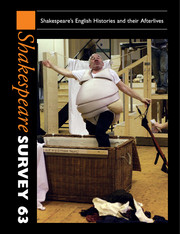Book contents
- Frontmatter
- Shakespeare the Historian
- The Decline of the Chronicle and Shakespeare's History Plays
- Rites of Oblivion in Shakespearian History Plays
- Richard II's Yorkist Editors
- Mapping the Globe: The Cartographic Gaze and Shakespeare's Henry IV Part 1
- Falstaff's Belly: Pathos, Prosthetics and Performance
- ‘And is Old Double Dead?’: Nation and Nostalgia in Henry IV Part 2
- Performing the Conflated Text of Henry IV: The Fortunes of Part Two
- Medley History: The Famous Victories of Henry the Fifth to Henry V
- Georgic Sovereignty in Henry V
- The Troublesome Reign, Richard II, and the Date of King John: A Study in Intertextuality
- The Trials of Queen Katherine in Henry VIII
- ‘Watch Out for Two-handed Swords’: Double-Edged Poetics in Howard Barker's Henry V in Two Parts (1971)
- Daunted at a Woman's Sight?: The Use and Abuse of Female Presence in Performances of the Histories as Cycles
- The RSC's ‘Glorious Moment’ and the Making of Shakespearian History
- Shakespeare as War Memorial: Remembrance and commemoration in the Great War
- Shakespearian Biography, Biblical Allusion and Early Modern Practices of Reading Scripture
- Filling in the ‘Wife-Shaped Void’: The Contemporary Afterlife of Anne Hathaway
- Shakespeare and Machiavelli: A Caveat
- Shame and Reflection in Montaigne and Shakespeare
- Playing the Law for Lawyers: Witnessing, Evidence and the Law of Contract in The Comedy of Errors
- Shakespeare's Narcissus: Omnipresent Love in Venus and Adonis
- Surface Tensions: Ceremony and Shame in Much Ado About Nothing
- ‘Remember Me’: Shylock on the Postwar German Stage
- ‘Dangerous and Rebel Prince’: A Television Adaptation of Hamlet in Late Francoist Spain
- What Shakespeare Did with the Queen's Men's King Leir and When
- Re-cognizing Leontes
- Shakespeare Performances in England 2009
- Professional Shakespeare Productions in the British Isles, January–December 2008
- The Year's Contribution to Shakespeare Studies 1 Critical Studies
- 2 Shakespeare in Performance
- 3 Editions and Textual Studies
- Index to Volume 63
Surface Tensions: Ceremony and Shame in Much Ado About Nothing
Published online by Cambridge University Press: 28 November 2010
- Frontmatter
- Shakespeare the Historian
- The Decline of the Chronicle and Shakespeare's History Plays
- Rites of Oblivion in Shakespearian History Plays
- Richard II's Yorkist Editors
- Mapping the Globe: The Cartographic Gaze and Shakespeare's Henry IV Part 1
- Falstaff's Belly: Pathos, Prosthetics and Performance
- ‘And is Old Double Dead?’: Nation and Nostalgia in Henry IV Part 2
- Performing the Conflated Text of Henry IV: The Fortunes of Part Two
- Medley History: The Famous Victories of Henry the Fifth to Henry V
- Georgic Sovereignty in Henry V
- The Troublesome Reign, Richard II, and the Date of King John: A Study in Intertextuality
- The Trials of Queen Katherine in Henry VIII
- ‘Watch Out for Two-handed Swords’: Double-Edged Poetics in Howard Barker's Henry V in Two Parts (1971)
- Daunted at a Woman's Sight?: The Use and Abuse of Female Presence in Performances of the Histories as Cycles
- The RSC's ‘Glorious Moment’ and the Making of Shakespearian History
- Shakespeare as War Memorial: Remembrance and commemoration in the Great War
- Shakespearian Biography, Biblical Allusion and Early Modern Practices of Reading Scripture
- Filling in the ‘Wife-Shaped Void’: The Contemporary Afterlife of Anne Hathaway
- Shakespeare and Machiavelli: A Caveat
- Shame and Reflection in Montaigne and Shakespeare
- Playing the Law for Lawyers: Witnessing, Evidence and the Law of Contract in The Comedy of Errors
- Shakespeare's Narcissus: Omnipresent Love in Venus and Adonis
- Surface Tensions: Ceremony and Shame in Much Ado About Nothing
- ‘Remember Me’: Shylock on the Postwar German Stage
- ‘Dangerous and Rebel Prince’: A Television Adaptation of Hamlet in Late Francoist Spain
- What Shakespeare Did with the Queen's Men's King Leir and When
- Re-cognizing Leontes
- Shakespeare Performances in England 2009
- Professional Shakespeare Productions in the British Isles, January–December 2008
- The Year's Contribution to Shakespeare Studies 1 Critical Studies
- 2 Shakespeare in Performance
- 3 Editions and Textual Studies
- Index to Volume 63
Summary
Beatrice and Benedick ‘never meet but there's a skirmish of wit between them’ (1.1.60–1), we are warned, and their encounter a few lines later does not disappoint:
Ben. What, my dear Lady Disdain! Are you yet living?
Bea. Is it possible disdain should die while she hath such meet food to feed it as Signor Benedick? Courtesy itself must convert to disdain if you come in her presence.
Ben. Then is courtesy a turn-coat: but it is certain I am loved of all ladies, only you excepted…
(1.1.112–19)This greeting brilliantly captures the ceremonial idiom central to the social politics of Much Ado About Nothing. Both characters overplay deferential formality in their use of titles, ‘Lady Disdain’ and ‘Signor Benedick’, while simultaneously flouting the code of politeness in their insults. The satirical effect would be increased by appropriate courteous gestures of greeting: a formal bow from Benedick and an answering curtsey from Beatrice traverse the space between their bodies. Their ‘skirmish of wit’ immediately establishes Messina as a high-risk environment for face-to-face interactions, something that the tragi-comic extremes of the plot go on to demonstrate.
In the public, courtly environment of Leonato's household, identity is highly dependent on superficial signifiers and interactions. Benedick draws attention to both verbal and non-verbal surfaces in the play, pointedly warning his friends ‘The body of your discourse is sometime guarded with fragments, and the guards [decorations] are but slightly basted on, neither’ (1.1.268–70).
- Type
- Chapter
- Information
- Shakespeare Survey , pp. 282 - 289Publisher: Cambridge University PressPrint publication year: 2010
- 1
- Cited by

